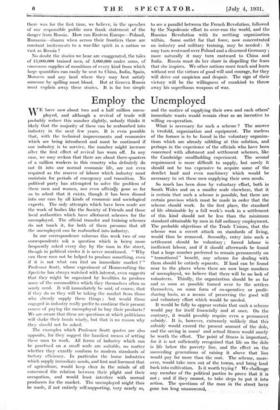Employ the Unemployed
WE have now about two and a half million unem- ployed, and although a revival of trade will probably reduce this number slightly, nobody thinks it likely that the majority of these can he reabsorbed into industry in the next few years. It is even possible that, with the technical improvements and economies which are being introduced and must be continued if our industry is to survive, the number might increase after the first effect of revival has worn off. In any case, we may reckon that there are about three-quarters of a million workers in this country who definitely do not fit into our normal economic life, are not even required as the reserve of labour which industry must maintain for periods of emergency and transition. No political party has attempted to solve the problem of these men and women, nor even officiatly gone so far as to admit that it exists, though it has been dinned into our ears by all kinds of economic and sociological experts. The only attempts which have been made are the work of bodies like the Society of Friends and those local authorities which have allotment schemes for the unemployed. The official transfer and training schemes do not touch it, for both of them presume that all the unemployed can be reabsorbed into industry.
In our correspondence columns this week two of our correspondents ask a question which is being more frequently asked every day by the man in the .street, though in political circles it is never mentioned. "Why can these men not be helped to produce something, even if it is not what can find an immediate market ? " Professor Scott, whose experiment of Homeerofting the Spectator has always watched with interest, even suggests ' that they might be organized by localities to produce some of the commodities which they themselves often so sorely need. It will immediately be said, of course, that if they do so they will be taking the market from those w.ho already supply these things ; but would those engaged in industry really prefer to continue their present course of paying the unemployed to buy their products ? We are aware that these are questions at which politicians will shake their heads wisely, but that is no reason why they should not be asked. .
The examples which Professor Scott quotes are also apposite, for they suggest the handiest means of setting these men to work. All forms of industry which can be practised on a small scale are suitable, no matter whether they exactly conform to modern standards of factory efficiency. In particular the home industries which supply immediate needs, and first and foremost that of agriculture, would keep clear in the minds of all concerned the relation between their plight and their occupation, and would least interfere with normal producers for the market. The unemployed might. thus be made, if not entirely, self-supporting, very nearly so, and the motive of supplying their own and each others' immediate wants would remain clear as an incentive to willing co-operation.
What is necessary for such a scheme ? The answer is twofold, organization and equipment. The nucleus of the former is to be found in the voluntary organiza- tions which are already nibbling at this solution, and perhaps in the experience of the officials who have been concerned with allotment and settlement schemes, like the Cambridge smallholding experiment. The second requirement is more difficult to supply, but surely it should not be too expensive to acquire some of the derelict land and even machinery which would be necessary to set these men supplying their own needs.
So much has been done by voluntary effort, both in South Wales and on a smaller scale elsewhere, that it is certain that such a scheme is possible, but there are certain provisos which must be made in order that the scheme should work. In the first place, the standard of life obtainable by a full week's work in a settlement of this kind should not be less than the minimum standard obtainable by men in full ordinary employment. The probable objections of the Trade Unions, that the scheme was a covert attack on standards of living, would thus be removed. Secondly, entry into such a settlement should be voluntary ; forced labour is inefficient labour, and if it should afterwards be found that a large number preferred to remain permanently on "transitional" benefit, any scheme for dealing with them should be entirely separate. If land can be found near to the places where there are now large numbers of unemployed, we believe that there will be no lack of volunteers. Thirdly, the organization should be as far and as soon as possible turned over to the settlers themselves, on some form of co-operative or profit- sharing basis, as a means of preserving the good will and voluntary effort which would be needed.
It would be folly to appear certain that such a scheme would pay for itself financially and at once. On the contrary, it would possibly require even a permanent subsidy. It is, however, extremely unlikely that' this subsidy would exceed the present amount of the dole, and the saving in moral and actual fitness would surely be worth the effort. The point of fitness is important, for it is not sufficiently recognized that life on the dole is life below the poverty line, and the effect on the succeeding generations of raising it above that line would pay far more than the cost. The scheme, more.- over, would take men out of the towns, and bring land back into cultivation. Is it worth trying? We challenge any member of the political parties to prove that it is not ; and if they cannot, to take steps to pit it into action. The questions of the man in the' street have. gone too long unanswered.










































 Previous page
Previous page